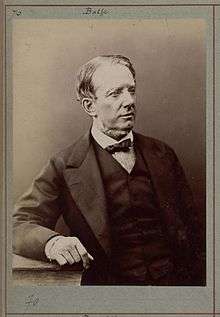The Armourer of Nantes
| Michael William Balfe |
|---|
 |
|
Operas
|
The Armourer of Nantes is an opera in three acts, with music by Michael William Balfe and libretto by J. V. Bridgman. The opera is based on Victor Hugo's Marie Tudor and set in Nantes, France, in 1498. The opera was first produced at Covent Garden, under the management of Louisa Pyne and William Harrison, on February 12, 1863.[1]
Roles
| Role | Voice type | Premiere Cast (Conductor: -) |
|---|---|---|
| The Baron de Villefranche (envoy of Louis XII of France) | bass | W. H. Weiss |
| Fabio Fabiani, Count de Beauvoir | baritone | Charles Santley |
| Raoul, the Armourer | tenor | William Harrison |
| The Count de Moulac | Mr. Goodwin | |
| The Count de St. Breux | Mr. James | |
| M. de Ploërchartel | Mr. Price | |
| M. de Coëtquen | Charles Lyall | |
| A Jew | baritone | H. Corel |
| Pascal (a Gaoler) | bass | Mr. Aynsley Cook |
| Marie (an Orphan) | soprano | Louisa Pyne |
| Anne, Duchess of Brittany | soprano | Anna Hiles |
| Dame Bertha | Mrs. Aynsley Cook |
Synopsis
The people of Brittany, in 1498, love Duchess Anne, who favors a dashing adventurer, Fabio Fabiani. The nobility envies this relationship, and the favor granted by the Duchess to Fabio, and they conspire against her, together with the French Ambassador. Raoul, an armourer from Nantes, has raised an orphan girl, Marie, who was mysteriously entrusted to him as an infant, and he has fallen in love with her. She turns out to be the heiress of a wealthy Breton noble. Fabio learns of this and kills the Jew who has the papers proving Marie's parentage, but not before Raoul finds out the truth. Fabio accuses Raoul of the murder, and taunts him with a letter from Marie. The Duchess learns of Fabio's crime, and eventually he is executed. Raoul and Marie reunited.
Reception
The reviewer in The Spectator noted that it was Balfe's most successful work among his recent operas, and predicted a successful run. He praised in particular many of its ballads as being among the best that Balfe composed, though he also stated that the subject required a "rather more dramatic treatment than Mr. Balfe is capable of."[2] Charles Lamb Kenney wrote that "there was not the same bright freshness and marked originality in their melodic inspiration taken as a whole."[3]
The opera has never been recorded.[4]
References
- ↑ George Grove, A Dictionary of Music and Musicians, "Armourer of Nantes," 1900.
- ↑ "1 uft ad. Ike prama". The Spectator. February 14, 1863. p. 14. Retrieved 2015-05-27.
- ↑ Charles Lamb Kenney. A Memoir of Michael William Balfe, Tinsley Brothers (1875) p. 255.
- ↑ "The Operas of Michael W. Balfe (1808-70)". The Victorian Web. Retrieved 2015-05-27.
External links
- Libretto as e-book at the Goethe University Frankfurt Library website